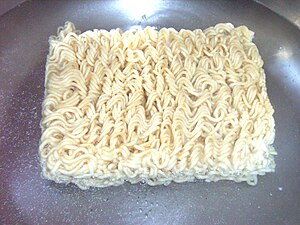Researchers from the University of Palermo investigated the relationship between sarcopenia
and magnesium status.

Gary Moller's old blog about health, fitness, nutrition, medicine, lifestyle and related topics.

 |
| Cycling Vanuatu: The best way to meet, mix and mingle with the locals. |
 |
| No tarted up resorts here: Just real hospitality by the First People of Vanuatu |
 Image via WikipediaZinc deficiency is one of the most common health issues I see daily. This is increasingly common in young people who are increasingly raised on a diet consisting mostly of noodles, pasta, white rice, refined cereals and chicken.
Image via WikipediaZinc deficiency is one of the most common health issues I see daily. This is increasingly common in young people who are increasingly raised on a diet consisting mostly of noodles, pasta, white rice, refined cereals and chicken. |
| Woman running on empty: A seriously depleted nutrient base. |
 CHICAGO - Beta carotene and vitamins A and E, antioxidant supplements taken by millions to fight disease, may actually raise the risk of death, a review of 68 studies on nearly a quarter-million people said today.
CHICAGO - Beta carotene and vitamins A and E, antioxidant supplements taken by millions to fight disease, may actually raise the risk of death, a review of 68 studies on nearly a quarter-million people said today.Funny isn't it? - Many of the best foods that contain the essential fats, minerals, vitamins and proteins are the ones that are bad for you - eggs, liver and butter! These are the high cholesterol foods that don't get the Heart Foundation tick. Do they really believe that margarine with synthetic vitamin A and cancer-producing trans-fatty acids is really better for you than pure New Zealand butter?
There is also the debate about "more being better". Of course, this is not the case and one should errr on the conservative side with vitamins unless the evidence tells you otherwise.
As an observation, when people with chronic health problems do consult me, there is usually more than a few signs of nutritional deficiency, such as magensium deficiency or low vitamin D. Often supplements are being taken but these may be synthetics that are poorly targetted to need. Another potential pitfall is to be taking too much of a single vitamin which may create an imbalance with others - nutrients need to be in balance with each other to be able to do their work.
So, take vitamins; but ensure they are mostly from natural sources. Take according to established need. Continue to ensure that your diet is your principal source of quality nutrients - quality meats, fruits, nuts, vegetables and whole grains.

 especially so for those who are taking prescription drugs, because many have a side effect that you'll never see mentioned on the label: the impairment of essential vitamin and nutrient absorption.
especially so for those who are taking prescription drugs, because many have a side effect that you'll never see mentioned on the label: the impairment of essential vitamin and nutrient absorption.Unfortunately this absorption problem is just the first link in a chain of events that adds up to a health issue that's far more serious than simple fatigue.
Many prescription pharmaceuticals interfere with the absorption of nutrients. For instance, drugs that inhibit stomach acids have been shown to significantly decrease absorption of vitamin B-12; one of the primary vitamins needed to prevent anaemia.
Other medications that are known to play a role in nutrient depletion are among the most frequently prescribed medications on the market. Antibiotics, anti-depressants, anti-inflammatories, blood pressure medications, cholesterol- lowering drugs, estrogen, and tranquilizers can all strip valuable vitamins and minerals from the body. When any of these drugs are combined - especially in an older patient - the risk of developing anemia rises.
And now it seems that this chain of events is being rushed along more quickly than ever. Did you know the average American senior receives 25 prescriptions annually - a 100 percent jump in just four years! So as the over-medication of seniors grows at an alarming rate, we see two serious problems becoming even greater health threats:
But the chain of events just keeps getting worse. Many mainstream doctors see so many elderly patients who have anaemia that the condition is widely regarded - somewhat lightly - as a normal part of ageing. As a result, when anaemia is diagnosed it often goes untreated. This is a mistake because anaemia dramatically increases the risk of mortality for those with chronic health problems such as heart disease. At the same time, anaemia can also promote cancer, which thrives in a cellular environment that's starved of oxygen.
Anaemia is easily diagnosed with a blood test, so during your next check up, ask your doctor for a test of your red cell blood count - especially if you're feeling unusually fatigued. If you do have an anaemic condition, the next step is to find out the cause. If your doctor downplays anaemia's importance, or if a prescription drug is recommended to address the problem, you should get a second opinion.
As for treating anaemia, you simply can't go wrong with the right nutrition and supplements. High doses of B group vitamins can be helpful, but not necessarily iron supplements. Take a broad spectrum Natural vitamin B supplement twice daily with iron rich food. The best source of iron is from natural dietary sources, plus a supplement from natural sources that steadily restore levels to normal.
The best dietary sources of iron red meat, fish, pork, and poultry, with beef liver and chicken liver having the highest amounts of iron. An additional intake of high quality vitamin C with iron rich food can also help the body absorb iron. Even an orange juice with your meal will help.
Talk to your doctor about discontinuing the use of any drugs that aren't absolutely necessary.
